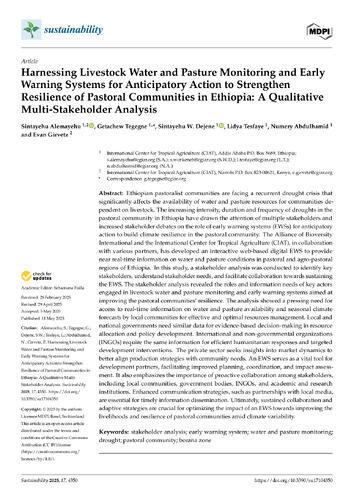
Ethiopian pastoralist communities are facing a recurrent drought crisis that significantly affects the availability of water and pasture resources for communities dependent on livestock. The increasing intensity, duration and frequency of droughts in the pastoral community in Ethiopia have drawn the attention of multiple stakeholders and increased stakeholder debates on the role of early warning systems (EWSs) for anticipatory action to build climate resilience in the pastoral community. The Alliance of Bioversity International and the International Center for Tropical Agriculture (CIAT), in collaboration with various partners, has developed an interactive web-based digital EWS to provide near real-time information on water and pasture conditions in pastoral and agro-pastoral regions of Ethiopia. In this study, a stakeholder analysis was conducted to identify key stakeholders, understand stakeholder needs, and facilitate collaboration towards sustaining the EWS. The stakeholder analysis revealed the roles and information needs of key actors engaged in livestock water and pasture monitoring and early warning systems aimed at improving the pastoral communities’ resilience. The analysis showed a pressing need for access to real-time information on water and pasture availability and seasonal climate forecasts by local communities for effective and optimal resources management. Local and national governments need similar data for evidence-based decision-making in resource allocation and policy development. International and non-governmental organizations (INGOs) require the same information for efficient humanitarian responses and targeted development interventions. The private sector seeks insights into market dynamics to better align production strategies with community needs. An EWS serves as a vital tool for development partners, facilitating improved planning, coordination, and impact assessment. It also emphasizes the importance of proactive collaboration among stakeholders, including local communities, government bodies, INGOs, and academic and research institutions. Enhanced communication strategies, such as partnerships with local media, are essential for timely information dissemination. Ultimately, sustained collaboration and adaptive strategies are crucial for optimizing the impact of an EWS towards improving the livelihoods and resilience of pastoral communities amid climate variability.

